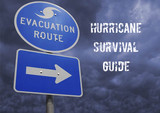Hurricane Survival Tips

First off, our thoughts and prayers go out to all that have been affected by Hurricane/Tropical Depression Florence.
Hurricanes and other Natural Disasters place large amounts of people in danger. Hurricanes specifically are tropical cyclones that can affect all of the Atlantic and Gulf of Mexico Coastal regions. They can also reach to several hundred miles inland; causing catastrophic damage. Often producing high speed winds (these winds cause dangerous flying debris), floods, rain, and Tornado's.
The after effects of Hurricane Florence left many that didn't evacuate without power and stranded from rescue personnel or with the ability to leave. If ordered to evacuate because you are at risk; you shouldn't take any chances. Leaving a threat area is RULE #1 of survival. It is important for you to know if your dwelling is in a flood prone area. That leaves you with deciding a evacuation location and routes on how to get there. Get of the “X”. Move from the danger area. You could survive the storm but the aftermath may leave you without food and other provisions.
If you do decide to leave to protect yourself and your family; protecting your home is your next step. Securing any outdoor furniture or bringing it inside. Experts suggest covering home windows with storm shutters or marine plywood measuring 5/8" thick. FEMA also suggest securing your roof to the frame structure to prevent damage. Reinforcing your garage door with ply wood is also not a bad idea.
If your in a high rise building and cannot leave get below the 10th floor. Take shelter in the fire escape stairwell.
You don't have to be a "prepper" to be prepared. Having a Emergency Kit or "Bug Out Bag" is a relatively easy first step to keeping yourself alive. Stocking provisions at your house can be an easy and affordable thing done in the right way. I will go over cost effective techniques in future articles as well as building a bargain bug out bag.
WATER
Water is a critical component to all living things. Having at least enough for 3 to 5 days is critical. Usually the average person will need a gallon of water a day (half gallon for drinking and the other half for sanitation or cooking). That's 1 gallon per person per day. It is also good to have a method of water purification. Unscented household bleach is also effective for water treatment. If you are sheltering in place fill bath tub and any containers you have for drinking water and sanitation (such as water to flush toilet).
FOOD
Non-perishable foods are best such as MRE's, protein or granola bars, peanut butter, dried cereals, and canned meats/vegetables/fruits. These are good because they don't require cooking; which is important if stuck inside without electricity and cooking with fire or stove may cause more danger. Also think about children and pets when stocking food stuffs.
MEDICAL
I always have a IFAK within reach; and if you don't you should get one ASAP. Check out our MDP and IFAK as a good starting point. This is just a general purpose good thing to have. You can't always be certain that medical professional will be able to respond to you in your time of need. Tourniquets and Quick Clot are good to have to stop serious bleeding. Make sure you have a substantial supply of any medicine's that you may need. Baby wipes were always a morale booster when I had to go weeks without a shower when deployed. I included basic personal hygiene gear in this category. Make sure diapers are plentiful if you have babies that require those.
DISASTER SUPPLY KIT
Your BOB should contain these items at the minumum:
- flashlights w/ batteries
- sleeping bags
- multi-tool
- cell phone chargers
- NOAA weather radio
- food, water, and water purification methods
- cigarette lighter
- first aid kit
- handgun for self-defense/extra mags
- extra clothing and inclimate weather gear
- maps with your planned evac route
- all pertinent documents and identifications (if you have to rebuild your life from total loss)
- children comfort items to keep them occupied
COMM and EVAC
Comm was the most important thing in operations we use in the Military. Understand that your cell phone may not work in a time of need. This has happened to me numerous times due to a tower overload. I've been stuck in traffic from a vehicle pile up and the tower was overloaded with calls. That brings us to texting. Texting most of the time will go through even when calls don't. Make sure all the members of your family have texting enable cell phones.
Planning your Evac location and route is important to bypass traffic delays. Getting an early start is also critical; waiting until the last minute will leave you in traffic for hours. Prior to evacuating ensure you bring all things of value and importance that you can. Develop a plan for traveling with your pet's. Gas may become short from an onslaught of evacuee's. Make sure to fill your tank before you plan to leave.
This is just a short list of tips. Develop a plan and execute the plan when the time calls. It’s better to be safe than dead
